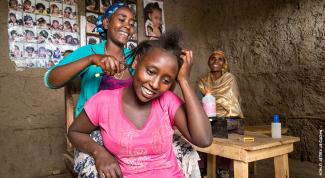In Ethiopia, 80 percent of the population resides in rural areas and women provide the majority of the agricultural labor in these communities. However, their contributions often go largely unrecognized and their fathers or husbands often restrict access to resources and community participation. Worse, one in three women experience physical, emotional or sexual violence, 65 percent of women have experienced female genital mutilation, and only half of girls who enroll in primary schools ever make it to grade 5.
USAID invests in empowering women and girls in Ethiopia across all of our programs by promoting equal access to education, health, and economic opportunities. In doing so, we help create opportunities for more equitable participation in society for females across the country. We also address the root causes of gender-based violence, child marriage, and female genital mutilation.
Increasing Female Educational Opportunities
Although the primary school enrollment rate of girls in Ethiopia has climbed from 21 to 91 percent in the last three decades, the majority are unable to transition to secondary and tertiary school due to distance, personal security and economic challenges. As girls grow older, academic participation becomes increasingly difficult as it takes time away from essential income generating activities. Only 35 percent of undergraduate university students are female and five percent drop out in the first year. At the same time, female-led instruction at the university level is extremely low at only 11 percent. To tackle these challenges and better support the continued education of the next generation of female Ethiopian leaders, our Reading for Ethiopia’s Achievement Developed activity focuses on improving reading skills in primary schools. We provide supplementary reading materials and purposefully support girls’ participation in reading clubs to enhance learning performance and increase retention.
Expanding Economic Opportunities for Women
Women often face different and more basic economic constraints than men, including less access to credit and limited market access. To support women’s ability to create businesses and secure their own livelihoods, we encourage financing for female-owned businesses through the Development Credit Authority. To support women in agriculture under the Feed the Future initiative, we empower women in decision-making about production, the use of resources like land, water, or capital, and control over income. We support women in chronically food insecure households by boosting access to improved farming inputs and creating income earning agricultural activities.
Promoting the Health and Safety of Women and Girls
According to the Ethiopian Demographic and Health Survey in 2016, 30 percent of Ethiopian women do not make decisions on individual and family issues. Instead, their husbands make decisions for them on choices including the option to use birth control methods, and whether to give birth in a health facility or seek the assistance of a trained provider. Additionally, harmful traditional practices—early marriage and childbearing, female genital mutilation and gender-based violence—all having adverse effects on Ethiopian women. Through the President’s Emergency Plan for AIDS Relief (PEPFAR), we address the HIV risks associated with early marriage. We also provide medical assistance for women and girls suffering from fistula—a birth injury common in very young mothers—and educate communities about the health risks of female genital mutilation. To boost maternal and newborn health, we support primary health care to end preventable child and maternal deaths and teach women about nutrition.
Related News and Resources
USAID Gender Equality and Female Empowerment Policy [PDF, 2.8MB]

